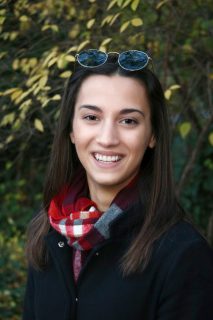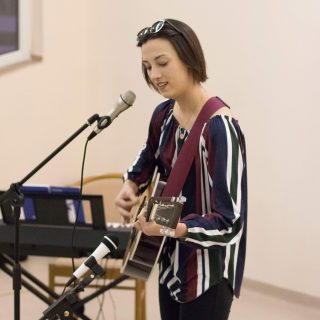Third-year student Noémi Madarász, the new president of the University’s student council has wanted to be a vet ever since kindergarten, just like many other children. But the four-year-old little girl was unique in the sense that she fully understood when her mother said she would have to learn a lot for that. She was ahead of her time in other things, too: she was still at high school in Orosháza, but she already felt as if she was a member of the Student Council. When it comes to veterinary science, she’s fascinated by its versatility. Here’s an extract of our interview with her.
GUSZTÁV BALÁZS
If you ask born-and-bred Orosháza residents about a particular church bell, they all say they cherish it very much. Their ancestors brought it from Zomba. Are you also a descendant of the families who settled here?
 The townspeople are all proud of how their ancestors became Orosháza citizens. The first 24 families came in 1774 from a village in Tolna county, where the Catholic lord decided not to tolerate the Lutheran religion in his village any more. They were followed by a second wave of settlers when my ancestors on one side of the family came here from Bánk and Csepreg. My other “part” walked here to the centre of Hungary all the way from Árva county, looking for livelihood. I come from a Lutheran family where nearly everyone worked in education. My grandmother started teaching at a kindergarten, then she went on to primary school. She reorganized the first church school in Orosháza in 1992. Today it is known as József Székács Lutheran Kindergarten, Primary School and Grammar School. My mother is also a teacher. My siblings chose this profession, too. My father was ordained as the pastor of Pusztaföldvár a few months ago.
The townspeople are all proud of how their ancestors became Orosháza citizens. The first 24 families came in 1774 from a village in Tolna county, where the Catholic lord decided not to tolerate the Lutheran religion in his village any more. They were followed by a second wave of settlers when my ancestors on one side of the family came here from Bánk and Csepreg. My other “part” walked here to the centre of Hungary all the way from Árva county, looking for livelihood. I come from a Lutheran family where nearly everyone worked in education. My grandmother started teaching at a kindergarten, then she went on to primary school. She reorganized the first church school in Orosháza in 1992. Today it is known as József Székács Lutheran Kindergarten, Primary School and Grammar School. My mother is also a teacher. My siblings chose this profession, too. My father was ordained as the pastor of Pusztaföldvár a few months ago.
I’m sure you inherited your love for music from the family, too!
My great-grandparents played professionally, which may have rubbed on me. I learnt to play the piano on my mother’s instrument. Driven by curiosity, I played classical and Polynesian guitar.
The Internet never forgets: there’s an orchestra video featuring you at high school age.
I attended a cantor training course in Fót for several years, but I learned classical church music, congregation songs and organ accompaniment. Our youth orchestra called Voice of the Glory played popular church music in Orosháza.
After a start like that, I’m genuinely surprised you chose the veterinary profession.
Probably because you weren’t there when I firmly declared as a four-year-old that I was going to become a vet.
Most of us don’t remember the things we said at the age of four!
This resolution is kind of inexplicable, but I clearly remember how my mother responded to it: that’s nice, Noémi, but you’ll have to study a lot and it’s not so easy at all. But if you really put your mind to it, you’ll make it happen!
I completed the eight years of study at the Lutheran school founded by my grandmother. Then I applied to Mihály Táncsics Grammar School because they had a biology programme and I knew I needed to learn this subject at a higher level in order to do well at the advanced A-levels.
Were you admitted to the University on your first attempt?
Yes, thank God.
What are you most interested in about veterinary medicine?
Its versatility, most of all. I’m very impressed by how vets need to have an insight into the entire area of science. I’m fascinated by the complexity of veterinary science, which I think is an ingenious discipline. That’s why I haven’t specialized in any area yet.
In fact, you got a sign from this “height”, too.
When the University’s students announced the first national veterinary medicine competition, I asked two of my classmates from Táncsics School to enter as a team. The competition builds bridges to the prospective students. When I was enrolled, I immediately signed up to become an organizer. I thought I would help the seniors any way I can, even wiping the sweat from their forehead, if that’s all I can do. That’s how I “infiltrated” the Student Council, too.
This year you were actively involved in the organization of the Fresher Camp(s) and the Fresher Ball. What’s your goal as the new president of the Student Council?
First of all, I want to help every student to show how they could enrich the university on top of their studies and knowledge. Let’s notice and discover everyone who stands out in something and could make our lives, council and university better in any way!
When were you in a theatre last time?
In October, in Békéscsaba, we have a season ticket to Jókai Theatre there. Whenever I travel home from the university, I join my mother and siblings. We like going to Madách and the Operetta Theatre in Budapest. I’m fond of musicals, most of all. I feel the deepest emotions when they are conveyed through music. My favourite play is Rebecca.
You also released a music video!
The Paper Bird song was inspired by the Mezőberény music camp, where we folded hundreds of paper bird figurines, put LED lights in them and hung them on the trees. I’m not the overly emotional type, but I like writing songs, which tend to end up in my desk drawer, though. Singing in front of cameras and lights instead of an audience is quite unnerving for me. It’s something out of my comfort zone. It requires acting, too, and I don’t like showing off something I know so little about. On the whole, I’m glad I got a peek into this world, I’m grateful to everyone who helped me, but I’m not going to do it regularly.
Finally, how do you see your future in, say, 10-20 years?
This question was easier to answer yesterday than today, because our lives change so quickly. A year ago I didn’t think I would be a member of the Student Council. If you’re asking where I want to be in 10 years’ time, my answer is I want to be married with children and work in veterinary practice. Not necessarily in a surgery, because I’m very interested in large animals too, especially cattle. Mixed practice appeals to me.
Over the past 18 months, I’ve been going to an Orosháza surgery to gain practical experience. I very much liked what I saw there. Each morning, the vet went to a small or a larger livestock farm around 6 or 7 a.m., took care of the animals, then spent the rest of the morning in the surgery curing small animals. Of course I loved it because, as I said, I am fascinated by the versatility of the profession. Small and large animal care both require completely different approaches and practical knowledge. And then, who knows what else life may bring for me?
